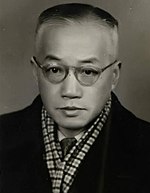Li Linsi, Date of Birth, Place of Birth, Date of Death
TweetLi Linsi
politician
 Date of Birth: 18-Feb-1896
Date of Birth: 18-Feb-1896
 Place of Birth: Hangzhou, Zhejiang, China
Place of Birth: Hangzhou, Zhejiang, China
Date of Death: 01-Jan-0001
Profession: politician
Zodiac Sign: Aquarius 
About Li Linsi
- Li Linsi (Chinese: ???; pinyin: Lì Línsì; 1896 – 1970); birth name Li Jiaxiang (???), was a modern Chinese educator, diplomat and scholar, who has been recognized as one of the key figures in modern Chinese cultural and diplomatic history.
- Hailed as China's Mahatma Gandhi, Li was the leader of China's nonviolent resistance against Japanese aggression.
- His military research contributed greatly to China's anti-Japanese war.
- He was known for his efforts to save hundreds of Jews fleeing to Shanghai during World War II.
- A diplomatic consultant to Chiang Kai-shek, Li was a key facilitator of the China-Germany relationship during the 1930s, and a major proponent of China's League of Nations diplomacy.
- He was a co-founder of some of China's most influential organizations, including the China branch of the United Nations and China Institute of World Cultural Cooperation at the League of Nations.
- Being reputed as a human bridge connecting Chinese and European cultures, Li made a great contribution to helping the West comprehend ancient Chinese philosophies, and introduced many Western progressive thoughts to China.
- A descendant of Jiang Ziya, the Chinese legendary founding prime minister during the Zhou Dynasty, Li was the fourth great-grandson of Li E, a leader of the Qing Dynasty poetry.
- His eldest son is Li Shengjiao, a noted Chinese diplomat and jurist.
- Li died in Shanghai during the Cultural Revolution.
Read more at Wikipedia

